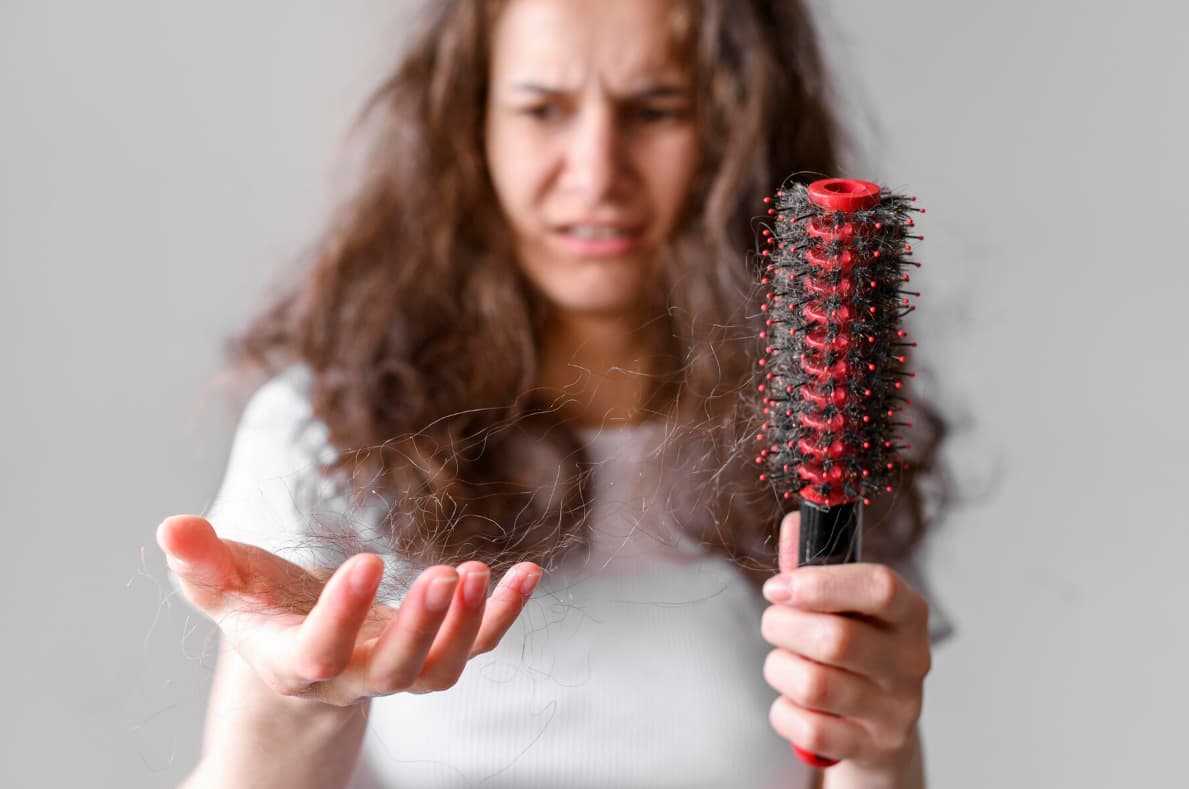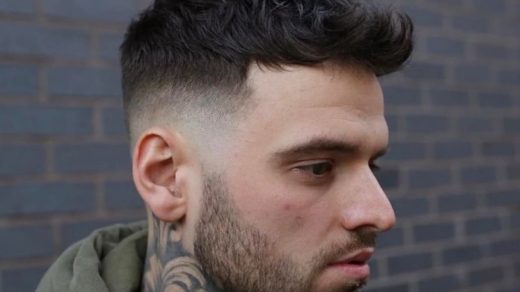Is your head of hair looking a bit thinner these days? Before you blame it on getting older, consider this surprising fact: Many causes of hair loss in women have nothing to do with age.
From genetics to styling habits, a variety of sneaky factors could be the culprit behind your diminishing ‘do. Let’s dive into the top 8 surprising reasons your luscious locks might be thinning out, and what you can do about it.
Top 8 Causes of Hair Loss in Women That Have Nothing to Do With Age

1. Genetics
If hair loss runs in your family, you can probably point a finger at your genes. Androgenetic alopecia, better known as female pattern baldness, is an inherited condition triggered by a combination of genes and hormones called androgens.
What it looks like: A widening part is often one of the first signs. You may also notice overall thinning, especially near the top of your head.
Fixing Methods:
- Minoxidil (Rogaine): An over-the-counter liquid or foam that can help regrow hair
- Spironolactone: A prescription pill that blocks the effects of androgens
- Low-level laser therapy: A device that uses laser light to stimulate hair growth
2. Intense Stress
Major physical or emotional stress can shift your hair follicles into a resting phase, causing them to shed a few months later. This type of hair loss is called telogen effluvium.
Triggers include:
- Giving birth
- Having surgery
- Losing a loved one
- Getting fired from a job
Fixing Methods:
- Manage stress through relaxation techniques like meditation, yoga, and deep breathing
- Ensure you’re getting enough iron, biotin, vitamin D, and zinc in your diet
- Be patient – this type of hair loss usually resolves on its own within 6 months
3. Supertight Hairstyles
Wearing your hair pulled back in a tight bun, braids, or ponytail on the daily? The constant tension can damage your hair follicles, leading to a type of hair loss called traction alopecia.
Fixing Methods:
- Loosen up your hairstyles or alternate with gentler looks
- Avoid heavy extensions and chemical relaxers
- Use silk hair ties, which are gentler than elastic
4. Harsh Styling Habits
Addicted to your flat iron or getting regular perms? Excessive heat styling and harsh chemicals can cause your hair to break off, in a condition called trichorrhexis nodosa.
Fixing Methods:
- Take a break from heat styling tools
- Use a sulfate-free, gentle shampoo
- Get regular trims to snip off damaged ends
- Consider a silk pillowcase, which is easier on strands than cotton
5. Severe Dandruff
If your scalp is constantly itchy and flaky, you might have seborrheic dermatitis, a severe form of dandruff. The inflammation can disrupt the normal hair growth cycle.
Fixing Methods:
- Use an over-the-counter dandruff shampoo with ingredients like zinc pyrithione, selenium sulfide, or ketoconazole
- See a dermatologist for a prescription-strength shampoo or topical steroid
- Avoid harsh chemical treatments and excessive heat styling
6. Inflamed Hair Follicles
Folliculitis is a condition in which hair follicles become inflamed from irritation (like shaving or tight clothing) or infection. In severe cases, it can lead to permanent hair loss.
Fixing Methods:
- See your doctor, who can diagnose the cause and prescribe antibiotics or antifungals if needed
- Use a gentle, fragrance-free moisturizer to soothe irritation
- Avoid tight hairstyles and clothing
7. Hormonal Imbalances
Fluctuating hormones, like the high androgen levels associated with polycystic ovary syndrome (PCOS) or the dips in estrogen that happen during perimenopause, can cause thinning hair.
Fixing Methods:
- See your doctor to diagnose and treat any underlying hormonal disorders
- Certain birth control pills may help by leveling out hormone fluctuations
- Discuss the possibility of hormone replacement therapy with your doctor
8. Autoimmune Diseases
Autoimmune disorders like alopecia areata, where the immune system attacks the hair follicles, and discoid lupus, which causes scaly scalp patches, can result in hair loss.
Fixing Methods:
- See a dermatologist, who may prescribe oral or injectable steroids or recommend an oral immunosuppressant
- In-office treatments like corticosteroid injections can help regrow hair
- At-home options include minoxidil and a class of drugs called JAK inhibitors
When to See a Dermatologist About Your Hair Loss?
Most cases of telogen effluvium (hair shedding) resolve on their own within 6 months. Make an appointment with a dermatologist if:
- Your hair doesn’t return to normal fullness within 6 months
- You notice a widening part, receding hairline, or patchy bald spots
- Your scalp is painful, burning, itching, or has rashes or flaky patches
During your visit, expect your dermatologist to:
- Examine your scalp and hair
- Ask about your medical and family history
- Possibly order blood tests to check for underlying conditions
They can then recommend a personalized treatment plan to stop hair loss and even regrow your locks.
Best Foods to Help Stop Hair Loss
In addition to addressing the underlying causes, noshing on nutrients essential for healthy hair can help keep your head of hair full and shining. Add these foods to your grocery cart:
| Food | Nutrient Perks |
|---|---|
| Eggs | Biotin, protein |
| Spinach | Iron, folate, vitamin C |
| Nuts & Seeds | Vitamin E, zinc, selenium |
| Fatty Fish | Omega-3s, protein, vitamin D |
| Sweet Potatoes | Beta-carotene |
| Avocados | Healthy fats, vitamin E |
FAQs on Hair Loss in Women
- How much hair loss is normal?
Losing 50-100 hairs a day is considered normal. Anything more than that could indicate a problem, especially if you notice your hair’s texture or thickness changing.
- Can stress cause hair loss?
Yes, significant physical or emotional stress can trigger telogen effluvium, a type of hair shedding. Hair usually grows back once the stressful event has passed.
- Can wearing your hair in a ponytail cause hair loss?
Tight hairstyles, including ponytails, buns, and braids, can lead to traction alopecia if worn often. Wear looser styles and alternate with leaving your hair down.
- What vitamin deficiency causes hair loss?
Low levels of iron, vitamin D, zinc, biotin, and protein have all been linked to hair loss. Eating a balanced diet rich in these nutrients can help keep your hair healthy.
- Does hair grow back after telogen effluvium?
In most cases, yes. Telogen effluvium, or hair shedding caused by stress, usually resolves on its own within 6 months. See a dermatologist if your hair doesn’t return to normal after this time.
Sources:
- StatPearls, Physiology, Hair
- National Library of Medicine, Aging Changes In Hair and Nails
- National Library of Medicine, Androgenetic Alopecia
- Cureus, Effects of Hormones and Endocrine Disorders on Hair Growth
- Genetics of Complex Cutaneous Disorders, Female Pattern Hair Loss: An Overview with Focus on the Genetics
The Bottom Line
From genes to tight ponytails, there are many possible causes of thinning hair in women that have zero to do with age.
If you’re experiencing hair loss, take heart: in many cases, there are steps you can take to halt the shedding and even regrow your gorgeous locks.
The most important thing is to see a dermatologist to get to the, erm, root of the problem. With their help and a little patience, your hair can return to its crowning glory.

